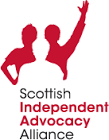Scottish Independent Advocacy Alliance resources: Advocacy Map and Human Rights Approach
The Scottish Independent Advocacy Alliance (SIAA) has recently published 2 new reports. The Advocacy Map gives a detailed breakdown of the funding and Advocacy services that are being delivered across Scotland and the challenges with this. This should be of real interest to anyone from an Independent Support organisation – to show how Local Authority funding does not ensure an adequate provision of service. The Advocating for Human Rights gives clear guidance for anyone in an advocacy type role, to how they can take on this approach in their practice.
Advocacy Map:
Key findings are:
- The most striking finding is that advocacy organisations have reported an increase of 5% in the numbers of people they have supported during the 2015/16 year
- Statutory funding has decreased by 4%
- Advocacy organisations supported 30,500 people
- There has been a reduction is the numbers of paid advocates
- There has been a reduction in the number of volunteer advocates
- Advocacy managers have been successful in securing some funding for short term projects to work with specific groups
- Advocacy organisations are prioritising people who are in crisis meaning that they are operating extensive waiting lists
- Some groups who should be able to access independent advocacy due to mental health issues are still not able to do so, including children and young people.
For most organisations demand for advocacy is so high that they have had to introduce systems to prioritise referrals. As a result, for some there can be a considerable waiting period. This means that there is only limited opportunity for any preventative work.
Organisations were asked to identify gaps in provision in their areas. Once more a major gap is that of independent advocacy for children with a mental disorder, this despite the statutory right of access.
Advocating for Human Rights:
SIAA have also published Advocating for Human Rights in collaboration with the Scottish Human Rights Commission. This provides guidance for advocates on using a human rights based approach in their practice. The aim is to raise awareness about human rights and to equip advocates to effectively support people to secure their rights.


